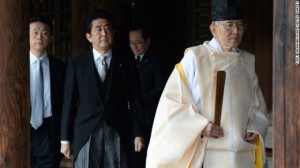Special to WorldTribune.com
By Donald Kirk, East-Asia-Intel.com
The shadows of war hang more menacingly over Northeast Asia at the opening of a brave new year than they have at any time since, well, since the last time the region was edging into armed conflict.
That might be since the Korean mini-crisis of nearly a year ago when North Korea was emitting a torrent of threats. Or it could be since the sinking of the Cheonan or any number of standoffs since the Korean War.

Only this time the shadows are lengthening for reasons that don’t have a lot to do with North or South Korea. The latest cause for hand-wringing and teeth-gnashing was Japan Prime Minister Shinzo Abe’s decision, in full knowledge of the sentiments of Koreans and Chinese, to visit the Yasukuni Shrine memorializing Japan’s millions of war dead.
The visit was incontrovertible evidence of Abe’s inbred nationalist zeal, for which he has more support among his own people than foreigners might realize. Japanese to whom I have spoken ask why foreign powers have the right to condemn a visit to a Japanese memorial. They say foreign criticism amounts to interference in Japan’s internal affairs and any Japanese can go to the shrine any time.
Then the question is why the Yasukuni Shrine memorializes 14 Japanese who were tried as Class A war criminals after World War II and why should the shrine also honor several hundred others who were also war criminals?
It’s possible to claim, as journalist Henry Scott-Stokes does in a recent book, that many of these people were no more criminals than those who ran the war for the other side. They were victims of victors’ justice, according to this reasoning, but who outside Japan buys that argument?
The sense of crisis deepens, moreover, as the Chinese persist in flying reconnaissance aircraft near the cluster of islands in the East China Sea known as the Senkakus in Japan and the Diaoyu in China. While Chinese fishing boats dart in and out of waters around the islands, chances of an outbreak of war seem all too realistic. Given that fear, Abe’s Yasukuni Shrine visit was a reminder not only of the millions who died fighting for Japan but of those who would die in renewed conflict against historic enemies.
Under these circumstances, it was no coincidence that the governor of the southernmost Japanese prefecture of Okinawa agreed on construction of a U.S. marine air station on the day that Abe visited the shrine. The U.S. is committed to moving thousands of Marines from Okinawa to Guam and elsewhere, but foes of the large U.S. marine and air force presence on Okinawa are sure to turn up the pressure while dredging begins in earnest for the base extending into the sea off the village of Henoko.
Inexorable moves toward confrontation in the East China Sea go along with Abe’s decision to thumb his nose at outcries from China, Japan’s huge competitor for regional domination, and South Korea, which should be Japan’s friend and ally in common cause against North Korea. The visit to the shrine provides one more reason for leaders of South Korea not to want to cooperate with Japan.
Counting on a groundswell of conservatism, nationalism and ethnocentrism, Abe is courting populist Japanese sentiment. The Japanese say the islands are part of Okinawa prefecture and are gearing up to defend them against any challenge from Beijing, which includes them in its newly declared Air Defense Identification Zone.
Against this background, a U.S. Marine air station on Okinawa’s northeast coast makes more sense than ever to Japanese and American strategists. Japanese and Americans argue that the base won’t add to U.S. forces on Okinawa but rather will replace the Marine air station at Futenma in the urban sprawl north of the Okinawa capital of Naha,
Abe’s foray to the shrine, however, puts the U.S. in an extremely delicate position diplomatically. The State Department expression of ”disappointment” with the Yasukuni gambit was a weasel-worded attempt to mollify South Korea while wagging a remonstrative finger at Japan.
In fact, the U.S. can do not much to rein in Abe’s ambitions while worrying about China’s support of North Korea. Kim Jong-Un emits conflicting signals as to whether he’s going to get more aggressive or try to appear more conciliatory while purging friends and allies of the ill-fated Jang Song-Thaek.
Carefully, Abe might appear to be veering toward moves to revise the Japanese constitution, imposed during the post-war U.S. occupation, and do away with Article Nine, which forbids Japan from waging war overseas.
Abe, however, needs U.S. forces in the region if the quarreling over the Senkakus/Diaoyu turns into a shooting war and the U.S. is called upon to make good on its promise to stand by the U.S.-Japan security treaty.
Columnist Donald Kirk is the author, most recently, of “Okinawa and Jeju: Bases of Discontent.” He’s reachable at kirkdon@yahoo.com.

You must be logged in to post a comment Login